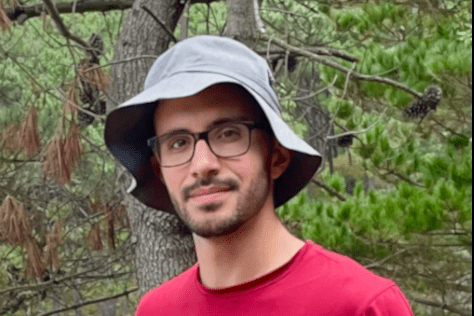PEOPLE

In his research, Joachim Burger combines different fields, such as Prehistoric Archaeology and Statistical Genomics. Together with his colleagues, he previously developed and used population genetic modelling approaches to address evolutionary and demographic questions related to the history of extinct populations. This work has helped to shed light on demographic processes underlying the Neolithic transition in Europe and Anatolia, the interaction between late hunter-gatherers and early farmers, the origins of lactase persistence and other processes of natural selection in prehistoric Europeans as well as the demographic history of wild and domestic cattle, pigs and dogs.

Maxime Brami is a prehistoric archaeologist specializing in early farming expansions beyond the Near East, in Anatolia and Southeast Europe. He joined the Palæogenetics group in 2018 with a Marie Skłodowska-Curie postdoctoral fellowship, with the expectation that he would take part in all the training from DNA extraction to more complex population genetics inference, and observe first hand how ancient DNA researchers work. With this background, he is looking at how archaeology and Palæogenetics can be more closely integrated through archaeology-informed demographic modelling and testing. Beside regularly attending excavations in Turkey and other countries, Maxime has published on early agricultural dispersals and frontiers, farmer-forager interaction and the history of the Neolithic concept. For further information see also: http://prehistoric-migrations.eu/
LEONARDO VALLINI

Leonardo Vallini is a postdoctoral researcher in the Palæogenetics Group, with a deep interest in multidisciplinary research and the integration of genetics with other lines of evidence such as archaeology and paleoclimate. He currently works primarily around the Late Antiquity – Early Medieval transition in the proximity of what used to be the Roman Empire border. His previous research focused on Upper Palaeolithic and the dynamics of the human dispersal in Eurasia after the Out of Africa.

Laura is a research associate and in charge of the ancient DNA laboratories of the Palæogenetics Group. The focus of her work is the generation of complete paleogenomes from archaeological remains. As part of the BIOMUSE project (https://biomuse.eu/), she worked on human skeletal material from Greece. Now she is working in a project focusing on human skeletons found in various caves in the Franconian Jura. She also teaches laboratory courses for master’s students.
Laura Winkelbach: BIOMUSE: Das genomische Erbe Griechenlands. Digitalisierte biologische Menschheitsgeschichte für Museen.
Katterinne Mendez: A genome-wide view of human adaptation to novel selective environments using ancient genomes.
Benedikt Kirsch-Gerweck: Detecting signatures of natural selection in ancient and modern genomes
Youssef Tawfik: The recent evolution of human life history
Christina Wurst: Illuminating the Evolutionary History of Atherosclerosis by Genetic Analysis of Human Mummies and Archaic Hominids.



